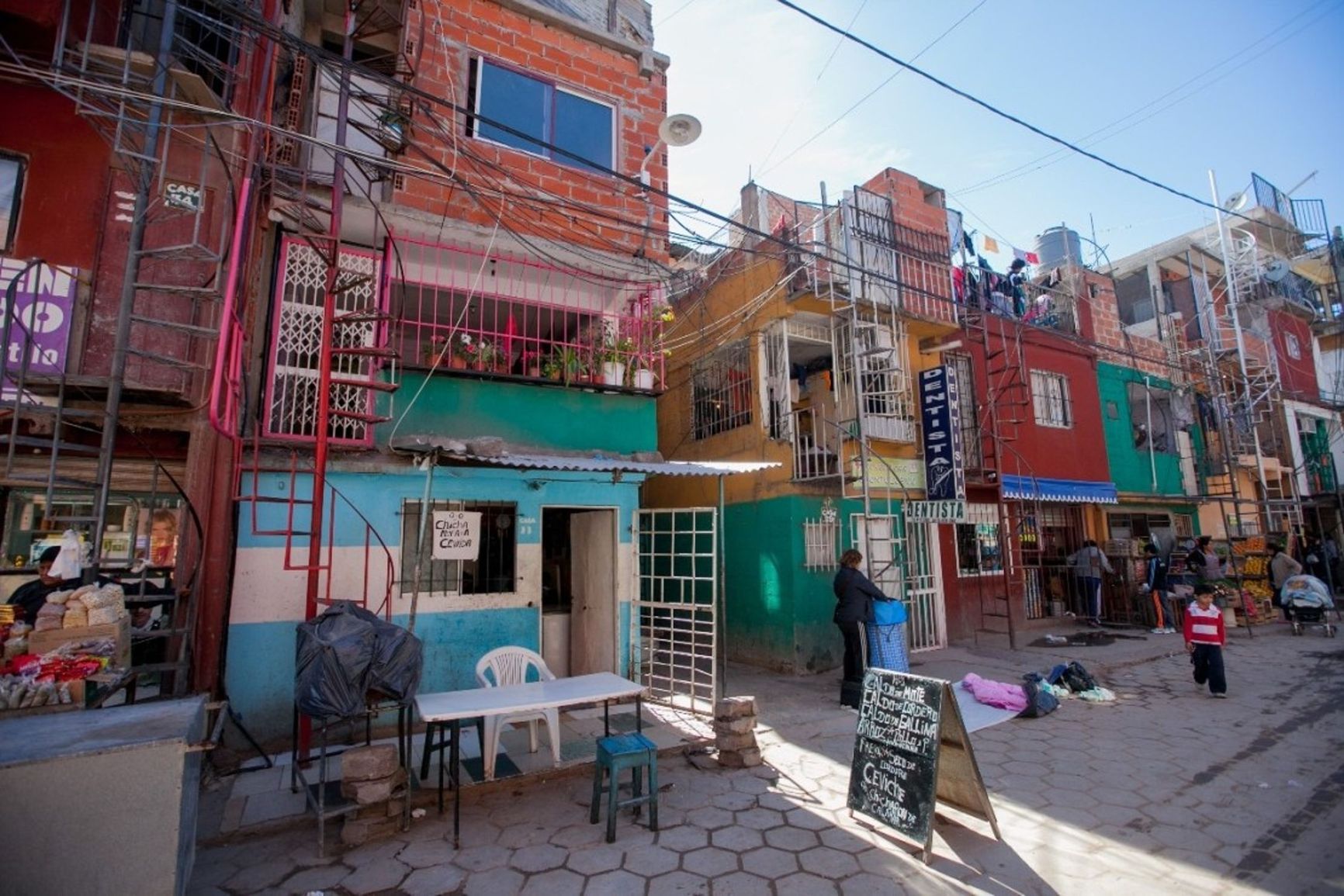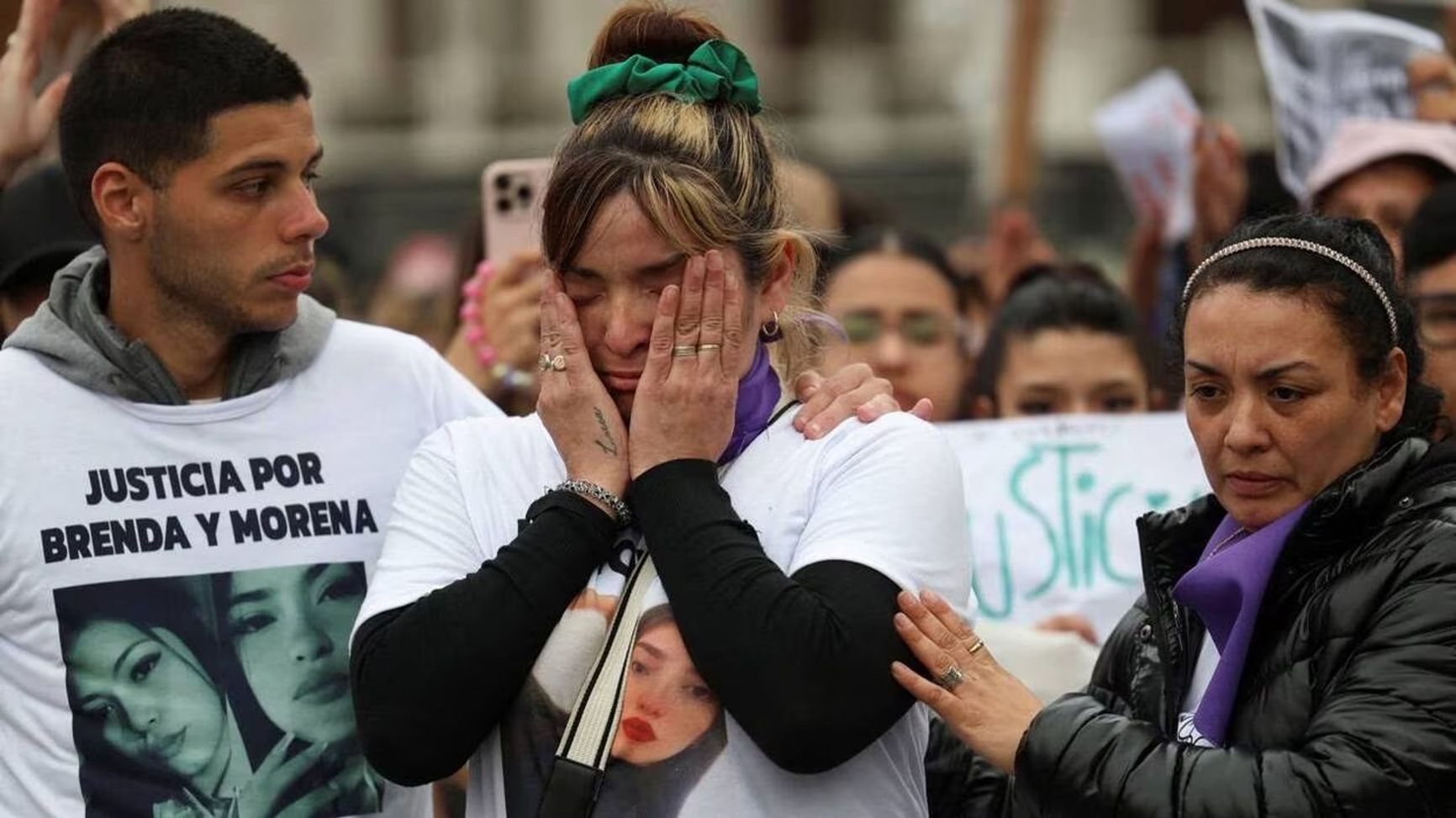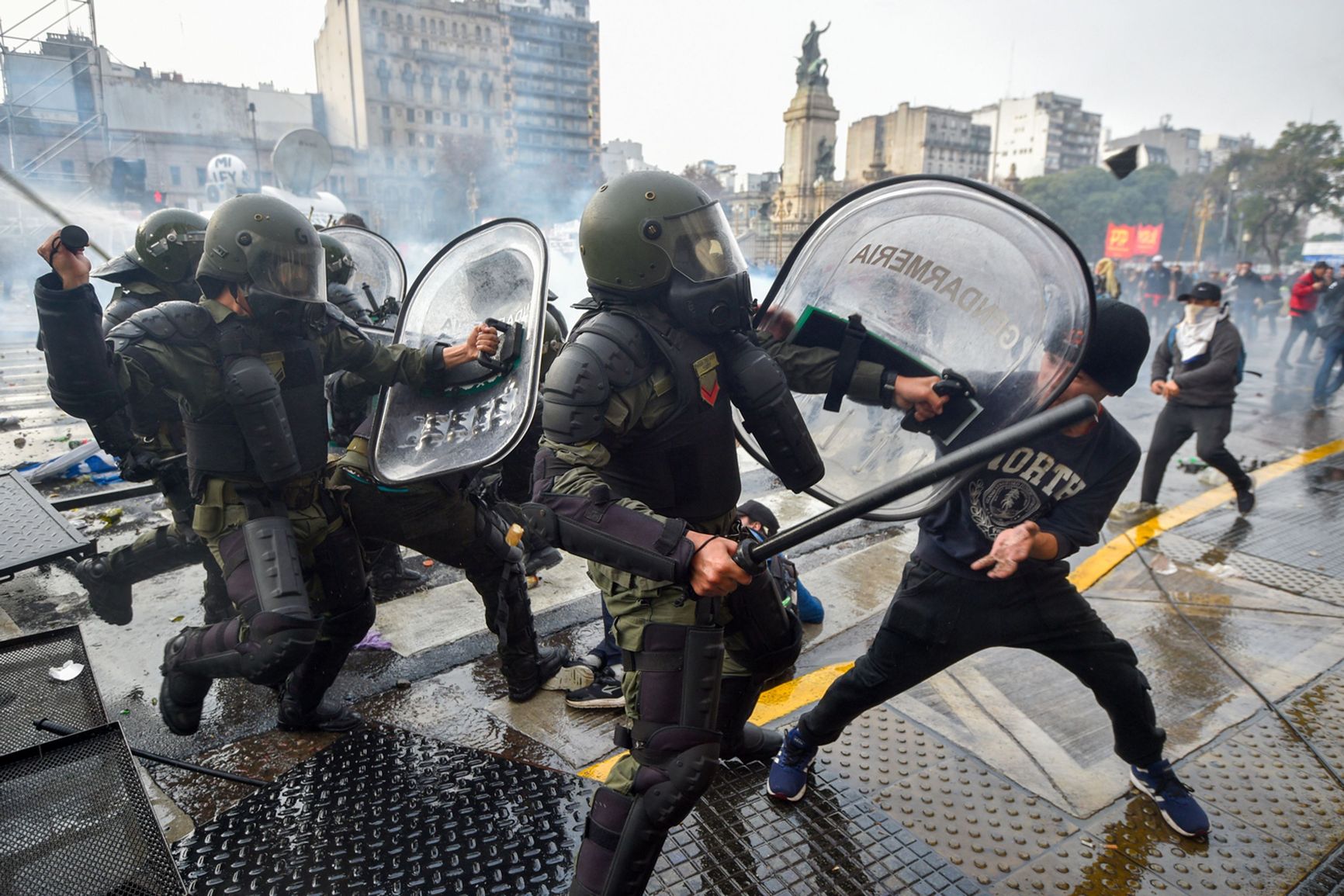

On Oct. 26, the radical right-wing Libertad Avanza party (“Freedom Advances”) of president Javier Milei took first place in Argentina’s midterm elections, securing 41% of the national vote. The main opposition group, Fuerza Patria (“Patriotic Force”), lagged nine points behind. However, despite its political victories, the government can boast little in terms of social or economic success: the number of poor and homeless people in the country has increased, while crime and drug trafficking problems have worsened.
Content
The cost of Javier Milei’s reforms
Bajo Flores
Drug trade “soldiers”
Race Day
Emigration is the only way out
Libertad Avanza, founded in 2021, continues to expand its influence in the Argentinian parliament. Last week’s midterm elections determined half of the 257 seats in the Chamber of Deputies and one-third of the 72 seats in the Argentine Senate. Following the vote, Javier Milei’s party more than tripled its representation, increasing its share of seats in the Chamber of Deputies from 37 to 101 and from 6 to 20 in the Senate.
The victory of president Javier Milie’s party came partly due to its joint electoral list with the moderately right-wing PRO (Propuesta Republicana, or “Republican Proposal”) party, which governed the country from 2015 to 2019. Since then, PRO’s influence has waned nationwide, leaving it a mere ally of Milei’s movement.
Voter turnout was below 70% – the lowest figure since 1983, when democracy returned to the country after the military dictatorship. Only four out of ten voters supported the far right, but that was more than enough to defeat the opposition, which failed to offer anything beyond the slogan “Stop Milei.”
The election results show that over 40% of voters are willing to accept the price Argentina is paying for radical reforms. With the new composition of parliament, the president will find it much easier to advance his initiatives. Despite rising prices, corruption scandals, the impoverishment of pensioners, and cuts to funding for education, healthcare, science, culture, and social and human rights programs, voters chose to believe the libertarian Milei, who urges them to endure hardship a little longer for the sake of a brighter future — promising to “make Argentina great again,” aided in part by the personal support of Donald Trump.
The cost of Javier Milei’s reforms
Javier Milei likes to say that his government is the best thing that has happened to Argentina in the past 125 years. The libertarian leader has managed to slow inflation growth (now rising by just 2.1% per month) and eliminate the budget deficit.
But these achievements have come at a steep price. Any reminder that they are accompanied by soaring prices, record high foreign debt (which has grown sharply over the past two years due to new IMF loans), and a 17% drop in mass consumption in the first year of his presidency infuriates Milei. Even according to official figures, widely criticized by independent researchers, one in three Argentines cannot afford to meet even their most basic needs.
The libertarian enjoys discussing abstract economic theories but avoids addressing the country’s current realities, blaming every hardship and setback on the proposition that he simply has not been in power long enough.
Milei blames every hardship and failure on the proposition that he has not been in power long enough
Before becoming president, Javier Milei was a frequent talk show guest, invited mainly because, as a libertarian entertainer, he openly and fiercely insulted those in power. Once he became president, however, Milei lost his fondness for journalists. He now grants interviews only to the most loyal media outlets and avoids any sharp questions, expecting nothing but praise from his interlocutors.
However, many media outlets that supported him during his campaign cannot fully ignore the reality of his record in office. On Oct. 15, Milei appeared on air with pro-government host Eduardo Feinmann, who nevertheless had to ask about the hardships faced by millions of their fellow citizens: “Eighty percent of Argentines barely make it to the end of the month. Seventy percent run out of money by the 20th. People are struggling.” Milei exploded: “And what do you want me to do? Print more money? Print it like the Kirchnerists did?”
The approach appears to be not only bad economics, but bad politics as well. As economist Raúl Dellatorre told The Insider: “What shocks me most about Milei’s government is the level of improvisation. Their main strategy is to keep postponing unresolved problems. The cost of those macroeconomic indicators the president is so proud of is staggering. Public healthcare, schools, and universities are in critical condition. There’s no money for anything. The situation of the poorest people is disastrous. I’m very afraid that sooner or later this will end in unrest and violence. First, the poor will fight each other for a portion of food, and then they’ll band together and start looting nearby neighborhoods.”
First, the poor will fight each other for a portion of food, and then they’ll band together and start looting nearby neighborhoods
Buenos Aires is now placing its hopes on Donald Trump and an American loan: $20 billion directly from the U.S. Treasury in the form of a swap (an exchange of dollars for Argentine pesos) and another $20 billion as credit from private banks. However, after promising to help Milei, Trump immediately clarified that the disbursement of funds would depend on the outcome of Argentina’s parliamentary elections.
Soon afterward, reports emerged that the White House might increase imports of Argentine beef to help bring down meat prices in the U.S. When asked by reporters whether this measure would benefit Argentines more than American farmers, Trump replied, “They have no money, and they’re fighting for their lives with everything they’ve got.”

Why would Trump want to help Milei? “There’s personal sympathy, of course, along with the prospect of gaining access to Argentina’s natural resources and the desire, within the broader trade war, to push China out of Argentina. The two largest Latin American economies — Brazil and Mexico — are both at odds with the current U.S. administration and continue to deepen their ties with Beijing,” Dellatorre explained.
The terms under which Buenos Aires will receive funds from the U.S. Treasury remain unknown. What is clear, however, is how the money will be used: to cover overdue payments on Argentina’s foreign debt. Taking out new loans to pay off old ones is precisely what Javier Milei vowed during his presidential campaign that he would never do. Yet that is exactly what he has been doing — since the very start of his presidency.
Bajo Flores
Ana and Nelly are Peruvians who have lived in Argentina for more than 20 years. From Monday to Friday, they prepare free lunches for the needy in Bajo Flores, one of Buenos Aires’s poorest districts. There, regular urban housing borders on the villa — a vast slum of multistory shacks.
The establishments that serve free hot meals are known as comedores. According to city hall, there are currently 82 such facilities operating in Buenos Aires, along with another 47 dining halls run by churches. “We don’t campaign for the right or the left. We just feed people. That’s what matters,” Ana and Nelly repeat several times.
The first comedores appeared in Argentina in the 1980s during a period of hyperinflation, and they became an integral part of low-income neighborhoods during the severe economic crisis of 2001. The number and makeup of people visiting these free kitchens are a clear reflection of the country’s overall condition.
About half an hour before meal distribution begins, a long line forms outside the Bajo Flores comedor. The crowd is diverse: mothers with children, teenagers, middle-aged men, several people with disabilities, and a large number of elderly people. The city allocates enough food each day for 350 servings. The menu includes meat with gravy, pasta, white bread, and flan — packed in plastic containers that people bring from home.
“Since Milei became president, the number of visitors has nearly tripled. There are always more people wanting food than we can serve, so there’s a waiting list. Before, it was mostly villa residents and migrants from Paraguay, Bolivia, and Peru. Now, more than half are Argentines — especially pensioners. They no longer have enough money even to eat a proper meal once a day,” Ana and Nelly say.
They no longer have enough money even to eat a proper meal once a day
Under Milei’s leadership, the minimum pension in Argentina amounts to about $260 per month. However, according to estimates by the state-run Defensoría de la Tercera Edad (Office for the Protection of the Elderly), minimum monthly expenses — for housing, transportation, utilities, medications, and groceries — cost senior citizens at least $1,000 a month.
Researchers at Centro CEPA (Center for Political Economy Studies of Argentina) calculated that between November 2023 (when Milei won the presidential runoff) and March 2025, prices for the medicines most commonly used by older people rose by more than 200% — after the far-right government lifted state price controls while cutting back subsidies.
Ana and Nelly say that for many pensioners, it was embarrassing to come for their first free meal. “Some admit they voted for Milei. They wanted change. They had worked all their lives and were sure they would never cross the threshold of a comedor. They thought only loafers and migrants living off the state came here. Now they see things differently. They thank us every day,” they say.
Since Milei took office and slashed state subsidies, the prices of water, electricity, and gas have soared by 500%, while cumulative inflation under previous governments already stood at 171%. The average gas bill in Argentina is now about $33, and the electricity bill about $43. As a result of a failure to keep up with the bills, many retirees have had their services cut off.
The comedor in Bajo Flores is closed on weekends, which makes Fridays particularly difficult. “Some people have absolutely nothing to eat over the weekend. They ask us for whatever we can spare — extra bread or cookies — just to make it through to Monday,” Ana and Nelly explain.
Other newcomers to the free dining halls are those who have lost their jobs or are surviving on temporary gigs. Until recently, many considered themselves part of the lower middle class. Now, however, they have no money left for food after paying rent. According to Zonaprop, one of Argentina’s largest real estate platforms, renting a place to live in Buenos Aires in 2025 has become 20% more expensive in dollar terms. On average, a two-room apartment now rents for about $850 a month, with another $100 for utilities on top.
During Milei’s year and a half in office, an total of 183,500 people lost their jobs and stopped paying into the pension system, according to SIPA (Argentina’s Integrated Pension System). Of those, 57% were laid off from private companies.
The number of homeless people in Buenos Aires has risen by 55% over the past two years, with more children and elderly among them. City authorities report about 4,500 homeless residents, but charitable organizations — whose volunteers make nightly rounds — say the real figure is well above 10,000. In June 2025, Milei’s government issued a special decree transferring full responsibility for the homeless to regional authorities.
“You can’t imagine how many people now live under the overpasses. There are groups of 10 to 20, whole families with children. I see them every day, even newborns sleeping right on cardboard,” Ana says. She explains why many refuse to go to the city-run shelters: “They’re huge hangars where everyone crowds in. No one watches what happens inside. You can get robbed, beaten, raped — even killed.”
Drug trade “soldiers”
Drug trafficking and the corruption and violence that accompany the illicit trade are a major problem across Latin America. Milei and his security minister Patricia Bullrich came to power promising to tackle crime with an iron fist, but two years later, the results of that campaign look rather questionable.
On Oct. 5, three weeks before the parliamentary vote, Milei’s party Libertad Avanza lost one of the key faces of its election campaign — José Luis Espert, an economist and congressional candidate from Buenos Aires Province. Espert was forced to withdraw his name from the running after it became known that he had received at least $200,000 from Argentine businessman Federico “Fred” Machado.

José Luis Espert (left) with “Fred” Machado
Machado lived in the United States for several years, training as a pilot before working in air transportation. Since 2021, “Fred” Machado has been under house arrest in Argentina, and at the end of November he is expected to be extradited to Texas, where he faces trial on five counts related to drug trafficking, money laundering, and large-scale fraud. According to the prosecution, Machado used airplanes to transport drugs from Colombia, Venezuela, Guatemala, and Mexico to the United States. The document confirming Machado’s $200,000 payment to Espert is included in the U.S. case file.
In addition to the money, photos emerged of Espert and Machado in front of a private jet, on which the politician had taken a total of 36 flights. Still, for an entire week before withdrawing from the race, Milei’s congressional candidate tried to justify himself, claiming he was the target of a media smear campaign — that he barely knew Machado and had been so politically inexperienced in 2019 that he accepted help from anyone who offered it. In the end, however, Espert stepped down.
On the day an Argentine court approved Machado’s extradition, the businessman sent a warning to Milei’s government through a known journalist: “I don’t want to go to the U.S. If that happens, I’ll take everyone down with me. If I start talking, the country will collapse tomorrow.”
After Espert’s withdrawal, the top spot on Milei’s party list for congressional candidates from Buenos Aires Province went to Diego Santilli — an accountant, politician, and member of the moderately right-wing PRO party, Milei’s main coalition partner. During the 2023 presidential campaign, Milei had called Santilli “a TikTok candidate and a fool from a province ruled by criminals and narcos. A guy who openly says he lives off his ‘businesses’ and gets smiles instead of questions. Everyone knows he’s corrupt.” Today, the president acts as if none of that ever happened.
Ana and Nelly have seen the effects: “When the state pulls its social programs out of the villas and abandons the poorest and most vulnerable, criminals and drug traffickers immediately fill the void. Since Milei and [security minister Patricia] Bullrich came to power, drug sales and use have surged. Illegal weapons, violence, and racism have all increased. If the ‘soldiers’ of the drug trade in the villas used to be 13- or 14-year-olds, now they are 8- or 9-year-old children. They stand on street corners, keeping watch and relaying messages.”
When the state abandons the poorest and most vulnerable, criminals and drug traffickers immediately move in
Gunfire erupts in the Bajo Flores villa every night, especially on weekends. Gangs divide the territory. “Of course there are fatalities. At Flores Cemetery, there is an entire section with graves of teenagers from the villa. Rows of these graves keep growing,” Ana says.
On Sept. 24, Argentina was shocked by the news of a brutal triple murder in Buenos Aires Province, where the bodies of 20-year-olds Brenda and Morena, and 15-year-old Lara, were discovered. The girls were involved in prostitution. Before being killed, they were brutally tortured. Three Peruvians and six Argentines were arrested in connection with the case. The suspects were based in the Bajo Flores villa. According to investigators, the murders were a warning execution for members of a drug trafficking gang. Allegedly, a relative of one of the girls had stolen cocaine from the criminals.

Meanwhile, the government has cut — or even completely eliminated — at least a dozen social programs, including those aimed at helping at-risk youth in poor neighborhoods. Milei believes the state should not interfere in citizens’ lives and that only the strongest survive. In early October, the president and security minister Bullrich announced that they would soon present a new penal code to parliament, lowering the age of criminal responsibility for minors from 16 to 14.
Race Day
“I’ve lived in Argentina since 2000, and I don’t remember a time when hatred toward migrants was as strong as it is now. People who used to keep their thoughts to themselves now say everything to our faces — openly and aggressively. On the bus, in the store, just on the street. ‘Black Bolivian pig, lazy.’ ‘Get out of here!’ Racism has increased sharply in schools. My children encounter it constantly, and teachers have even begun to openly encourage it,” Nelly says.
The reasons for this, she believes, are clear. Racism has always existed, but previous Argentine governments at least publicly supported cultural diversity and the integration of foreigners into society. Javier Milei’s stance, by contrast, mirrors Donald Trump’s immigration rhetoric in the U.S.: migrants are criminals, living off the state, and must be fought. Milei’s government even reinstated an old holiday name on October 12, the anniversary of Christopher Columbus’s arrival in the Americas. For the past several years, Argentina had celebrated the “Day of Respect for Cultural Diversity” on this date. However, since 2024, it is once again called “Race Day.”
The shift is not just rhetorical. On May 29, 2025, presidential decree No. 366 was issued, radically changing the rules for obtaining residency and citizenship. In a single day, Argentina went from being a country where it was relatively easy and quick to obtain residency to a place where thousands of migrants became undocumented or potentially undocumented.
The decree also made it easier to deport foreigners who commit crimes and made access to free higher education and healthcare more difficult for migrants. Emergency assistance is still provided, but migrants are now expected to pay for tests themselves. The same applies to treatment for chronic illnesses.
Emigration is the only way out
Argentina’s public universities are going through hard times. Milei vetoed a law that would have allocated funds to universities, and when parliament overrode the presidential veto, the president announced that he would not release the money until deputies and senators explained where the funds would come from.

The change will make it harder for thousands of Argentines to escape poverty, says Romina, who was born and raised in a villa family with a father who struggled with drug addiction. “Free, accessible higher education — that’s the Argentine miracle. It’s what truly changed lives. I know this from my own experience,” she said.
After earning an anthropology degree at the state-run National University of San Martín, in 2023 Romina received a government scholarship for four years of graduate study. Before Milei came to power, such a scholarship covered tuition and included monthly payments indexed to inflation. Not anymore.
“I work a million hours and barely make ends meet. After the 20th of each month, I start buying groceries on credit. Milei’s government has frozen our scholarships. They’re no longer indexed at all. Mine is now 700,000 pesos ($466),” she says. Instead of fully focusing on her scientific work, she constantly has to find extra income to support herself and her son.
Like most of her colleagues, Romina is now looking for scholarship opportunities abroad. “Milei’s government makes it clear that they don’t care about education, science, or the arts. I’m so tired of fighting,” she admits. Official data show that over the past two years, investments in science and technology have fallen by 50%. In 2025, they account for just 0.15% of GDP.
Yet despite widespread social discontent, Javier Milei and his party emerged as the winners of the election campaign. Their results indicate that Argentina is headed for even deeper social changes. The defeated left-wing opposition, still reeling from corruption scandals, has so far been unable to stop a president promising radical reforms that come with the backing of Donald Trump’s America.